Acute Care Nursing: Cause, Incidence, Risk Factors, Symptoms, and Nursing Care Strategies for CHF
VerifiedAdded on 2023/06/08
|11
|3135
|80
AI Summary
This article discusses the cause, incidence, risk factors, symptoms, and nursing care strategies for congestive heart failure (CHF) in acute care nursing. It also includes common drugs used in CHF treatment.
Contribute Materials
Your contribution can guide someone’s learning journey. Share your
documents today.
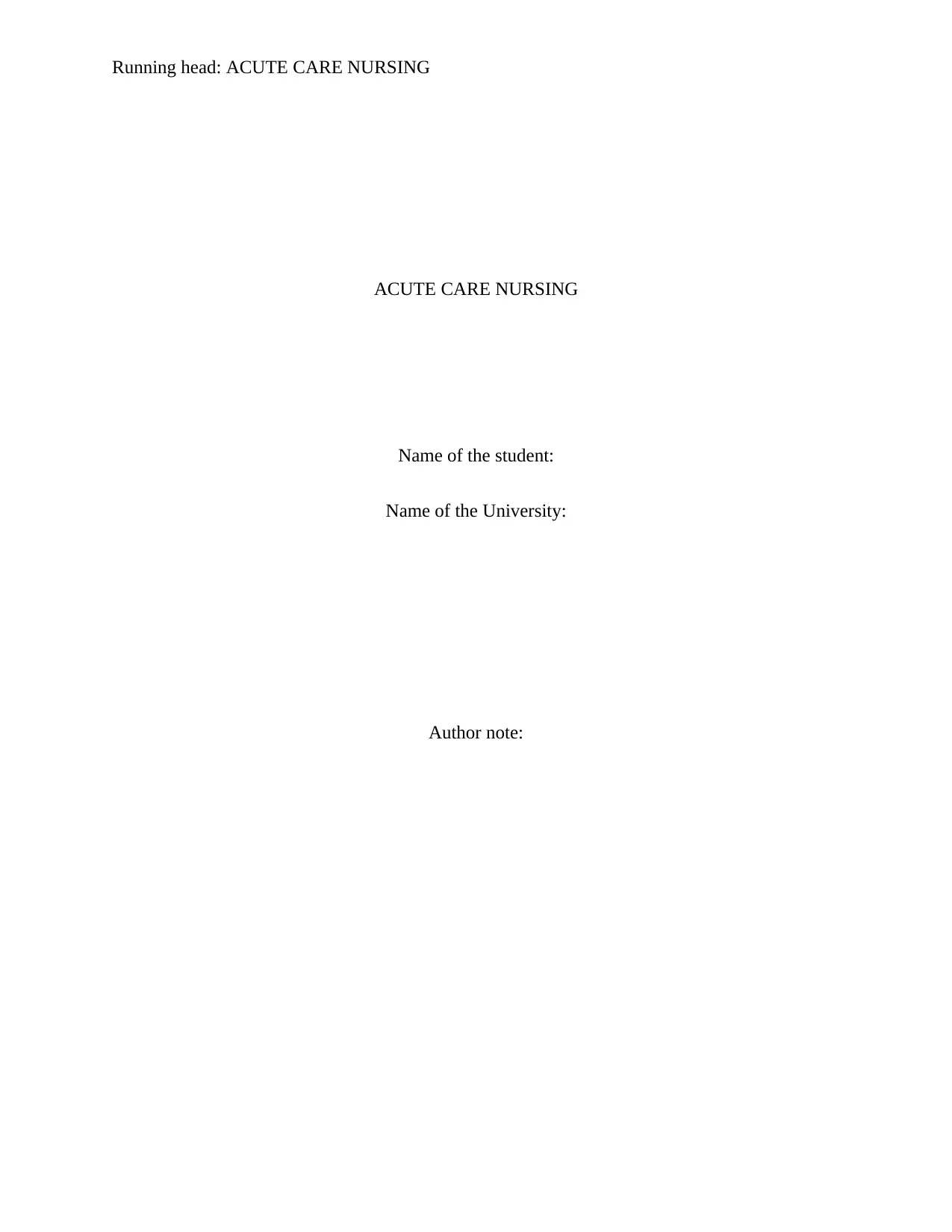
Running head: ACUTE CARE NURSING
ACUTE CARE NURSING
Name of the student:
Name of the University:
Author note:
ACUTE CARE NURSING
Name of the student:
Name of the University:
Author note:
Secure Best Marks with AI Grader
Need help grading? Try our AI Grader for instant feedback on your assignments.
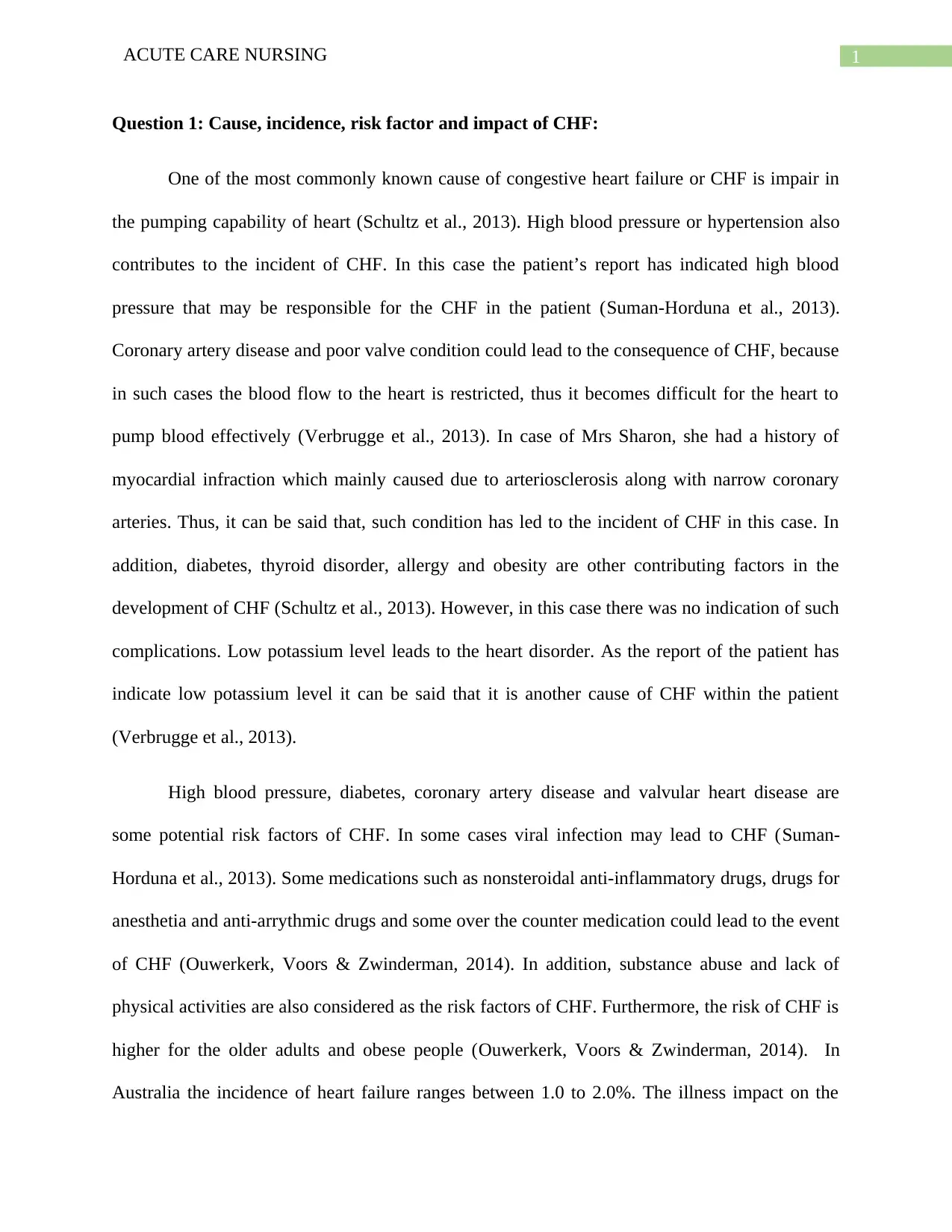
1ACUTE CARE NURSING
Question 1: Cause, incidence, risk factor and impact of CHF:
One of the most commonly known cause of congestive heart failure or CHF is impair in
the pumping capability of heart (Schultz et al., 2013). High blood pressure or hypertension also
contributes to the incident of CHF. In this case the patient’s report has indicated high blood
pressure that may be responsible for the CHF in the patient (Suman-Horduna et al., 2013).
Coronary artery disease and poor valve condition could lead to the consequence of CHF, because
in such cases the blood flow to the heart is restricted, thus it becomes difficult for the heart to
pump blood effectively (Verbrugge et al., 2013). In case of Mrs Sharon, she had a history of
myocardial infraction which mainly caused due to arteriosclerosis along with narrow coronary
arteries. Thus, it can be said that, such condition has led to the incident of CHF in this case. In
addition, diabetes, thyroid disorder, allergy and obesity are other contributing factors in the
development of CHF (Schultz et al., 2013). However, in this case there was no indication of such
complications. Low potassium level leads to the heart disorder. As the report of the patient has
indicate low potassium level it can be said that it is another cause of CHF within the patient
(Verbrugge et al., 2013).
High blood pressure, diabetes, coronary artery disease and valvular heart disease are
some potential risk factors of CHF. In some cases viral infection may lead to CHF (Suman-
Horduna et al., 2013). Some medications such as nonsteroidal anti-inflammatory drugs, drugs for
anesthetia and anti-arrythmic drugs and some over the counter medication could lead to the event
of CHF (Ouwerkerk, Voors & Zwinderman, 2014). In addition, substance abuse and lack of
physical activities are also considered as the risk factors of CHF. Furthermore, the risk of CHF is
higher for the older adults and obese people (Ouwerkerk, Voors & Zwinderman, 2014). In
Australia the incidence of heart failure ranges between 1.0 to 2.0%. The illness impact on the
Question 1: Cause, incidence, risk factor and impact of CHF:
One of the most commonly known cause of congestive heart failure or CHF is impair in
the pumping capability of heart (Schultz et al., 2013). High blood pressure or hypertension also
contributes to the incident of CHF. In this case the patient’s report has indicated high blood
pressure that may be responsible for the CHF in the patient (Suman-Horduna et al., 2013).
Coronary artery disease and poor valve condition could lead to the consequence of CHF, because
in such cases the blood flow to the heart is restricted, thus it becomes difficult for the heart to
pump blood effectively (Verbrugge et al., 2013). In case of Mrs Sharon, she had a history of
myocardial infraction which mainly caused due to arteriosclerosis along with narrow coronary
arteries. Thus, it can be said that, such condition has led to the incident of CHF in this case. In
addition, diabetes, thyroid disorder, allergy and obesity are other contributing factors in the
development of CHF (Schultz et al., 2013). However, in this case there was no indication of such
complications. Low potassium level leads to the heart disorder. As the report of the patient has
indicate low potassium level it can be said that it is another cause of CHF within the patient
(Verbrugge et al., 2013).
High blood pressure, diabetes, coronary artery disease and valvular heart disease are
some potential risk factors of CHF. In some cases viral infection may lead to CHF (Suman-
Horduna et al., 2013). Some medications such as nonsteroidal anti-inflammatory drugs, drugs for
anesthetia and anti-arrythmic drugs and some over the counter medication could lead to the event
of CHF (Ouwerkerk, Voors & Zwinderman, 2014). In addition, substance abuse and lack of
physical activities are also considered as the risk factors of CHF. Furthermore, the risk of CHF is
higher for the older adults and obese people (Ouwerkerk, Voors & Zwinderman, 2014). In
Australia the incidence of heart failure ranges between 1.0 to 2.0%. The illness impact on the
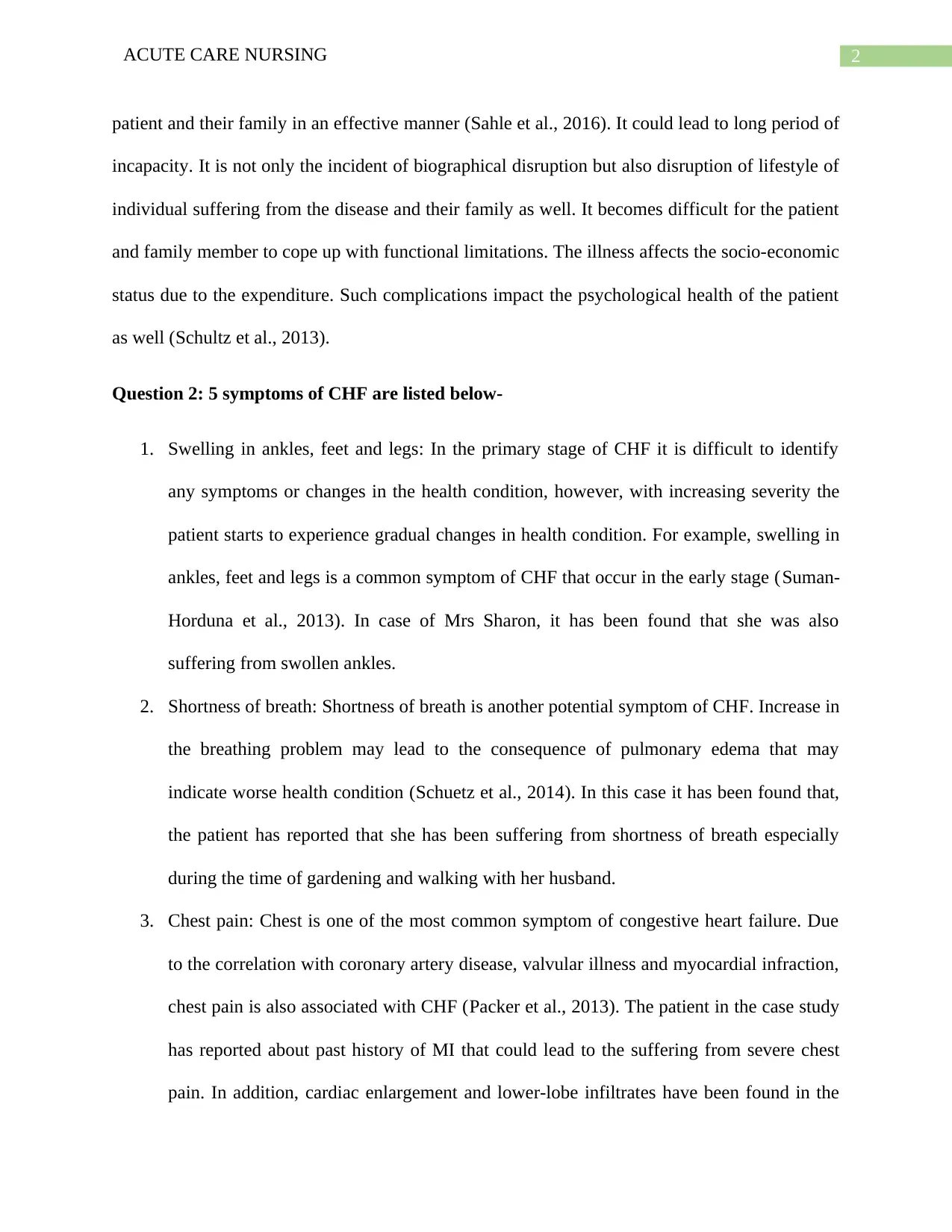
2ACUTE CARE NURSING
patient and their family in an effective manner (Sahle et al., 2016). It could lead to long period of
incapacity. It is not only the incident of biographical disruption but also disruption of lifestyle of
individual suffering from the disease and their family as well. It becomes difficult for the patient
and family member to cope up with functional limitations. The illness affects the socio-economic
status due to the expenditure. Such complications impact the psychological health of the patient
as well (Schultz et al., 2013).
Question 2: 5 symptoms of CHF are listed below-
1. Swelling in ankles, feet and legs: In the primary stage of CHF it is difficult to identify
any symptoms or changes in the health condition, however, with increasing severity the
patient starts to experience gradual changes in health condition. For example, swelling in
ankles, feet and legs is a common symptom of CHF that occur in the early stage (Suman-
Horduna et al., 2013). In case of Mrs Sharon, it has been found that she was also
suffering from swollen ankles.
2. Shortness of breath: Shortness of breath is another potential symptom of CHF. Increase in
the breathing problem may lead to the consequence of pulmonary edema that may
indicate worse health condition (Schuetz et al., 2014). In this case it has been found that,
the patient has reported that she has been suffering from shortness of breath especially
during the time of gardening and walking with her husband.
3. Chest pain: Chest is one of the most common symptom of congestive heart failure. Due
to the correlation with coronary artery disease, valvular illness and myocardial infraction,
chest pain is also associated with CHF (Packer et al., 2013). The patient in the case study
has reported about past history of MI that could lead to the suffering from severe chest
pain. In addition, cardiac enlargement and lower-lobe infiltrates have been found in the
patient and their family in an effective manner (Sahle et al., 2016). It could lead to long period of
incapacity. It is not only the incident of biographical disruption but also disruption of lifestyle of
individual suffering from the disease and their family as well. It becomes difficult for the patient
and family member to cope up with functional limitations. The illness affects the socio-economic
status due to the expenditure. Such complications impact the psychological health of the patient
as well (Schultz et al., 2013).
Question 2: 5 symptoms of CHF are listed below-
1. Swelling in ankles, feet and legs: In the primary stage of CHF it is difficult to identify
any symptoms or changes in the health condition, however, with increasing severity the
patient starts to experience gradual changes in health condition. For example, swelling in
ankles, feet and legs is a common symptom of CHF that occur in the early stage (Suman-
Horduna et al., 2013). In case of Mrs Sharon, it has been found that she was also
suffering from swollen ankles.
2. Shortness of breath: Shortness of breath is another potential symptom of CHF. Increase in
the breathing problem may lead to the consequence of pulmonary edema that may
indicate worse health condition (Schuetz et al., 2014). In this case it has been found that,
the patient has reported that she has been suffering from shortness of breath especially
during the time of gardening and walking with her husband.
3. Chest pain: Chest is one of the most common symptom of congestive heart failure. Due
to the correlation with coronary artery disease, valvular illness and myocardial infraction,
chest pain is also associated with CHF (Packer et al., 2013). The patient in the case study
has reported about past history of MI that could lead to the suffering from severe chest
pain. In addition, cardiac enlargement and lower-lobe infiltrates have been found in the
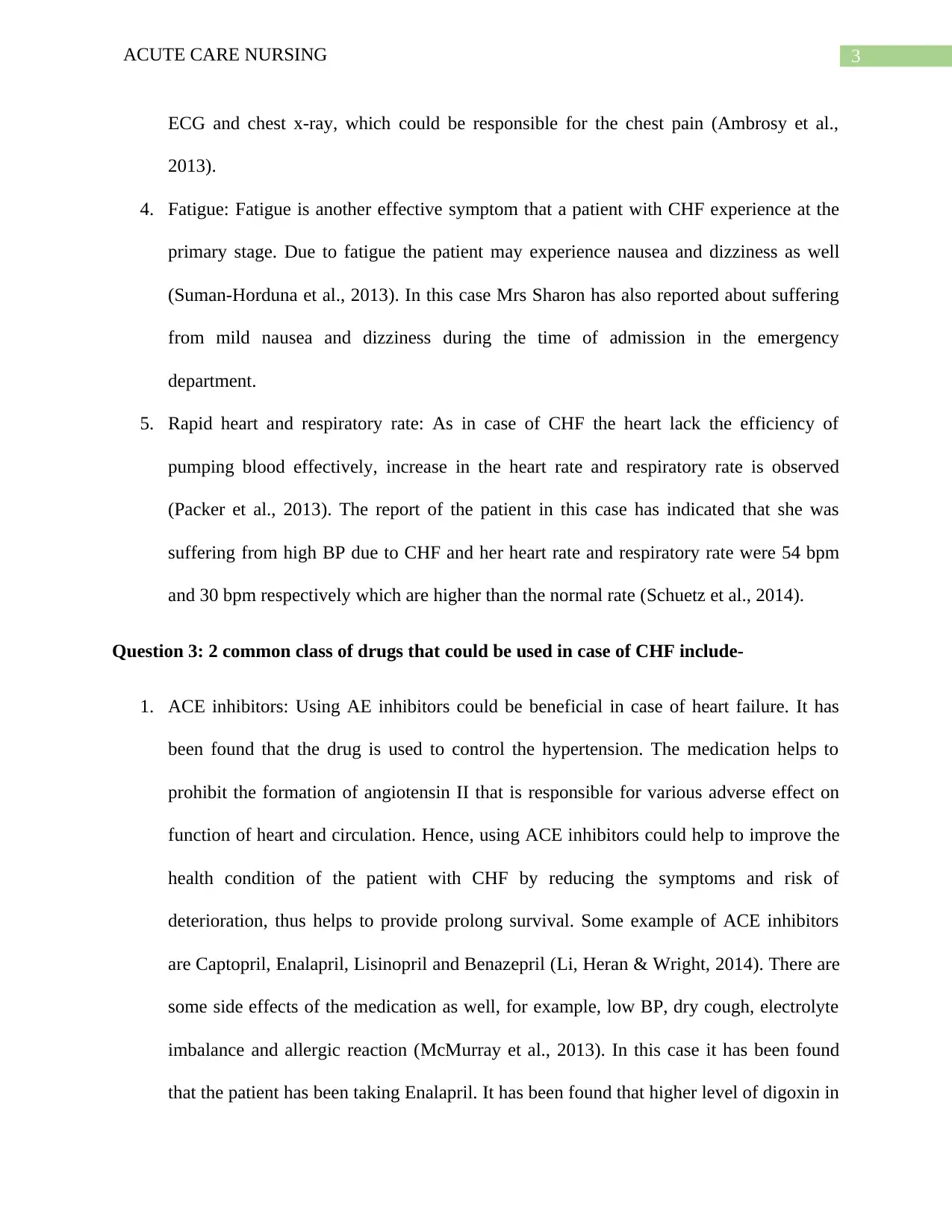
3ACUTE CARE NURSING
ECG and chest x-ray, which could be responsible for the chest pain (Ambrosy et al.,
2013).
4. Fatigue: Fatigue is another effective symptom that a patient with CHF experience at the
primary stage. Due to fatigue the patient may experience nausea and dizziness as well
(Suman-Horduna et al., 2013). In this case Mrs Sharon has also reported about suffering
from mild nausea and dizziness during the time of admission in the emergency
department.
5. Rapid heart and respiratory rate: As in case of CHF the heart lack the efficiency of
pumping blood effectively, increase in the heart rate and respiratory rate is observed
(Packer et al., 2013). The report of the patient in this case has indicated that she was
suffering from high BP due to CHF and her heart rate and respiratory rate were 54 bpm
and 30 bpm respectively which are higher than the normal rate (Schuetz et al., 2014).
Question 3: 2 common class of drugs that could be used in case of CHF include-
1. ACE inhibitors: Using AE inhibitors could be beneficial in case of heart failure. It has
been found that the drug is used to control the hypertension. The medication helps to
prohibit the formation of angiotensin II that is responsible for various adverse effect on
function of heart and circulation. Hence, using ACE inhibitors could help to improve the
health condition of the patient with CHF by reducing the symptoms and risk of
deterioration, thus helps to provide prolong survival. Some example of ACE inhibitors
are Captopril, Enalapril, Lisinopril and Benazepril (Li, Heran & Wright, 2014). There are
some side effects of the medication as well, for example, low BP, dry cough, electrolyte
imbalance and allergic reaction (McMurray et al., 2013). In this case it has been found
that the patient has been taking Enalapril. It has been found that higher level of digoxin in
ECG and chest x-ray, which could be responsible for the chest pain (Ambrosy et al.,
2013).
4. Fatigue: Fatigue is another effective symptom that a patient with CHF experience at the
primary stage. Due to fatigue the patient may experience nausea and dizziness as well
(Suman-Horduna et al., 2013). In this case Mrs Sharon has also reported about suffering
from mild nausea and dizziness during the time of admission in the emergency
department.
5. Rapid heart and respiratory rate: As in case of CHF the heart lack the efficiency of
pumping blood effectively, increase in the heart rate and respiratory rate is observed
(Packer et al., 2013). The report of the patient in this case has indicated that she was
suffering from high BP due to CHF and her heart rate and respiratory rate were 54 bpm
and 30 bpm respectively which are higher than the normal rate (Schuetz et al., 2014).
Question 3: 2 common class of drugs that could be used in case of CHF include-
1. ACE inhibitors: Using AE inhibitors could be beneficial in case of heart failure. It has
been found that the drug is used to control the hypertension. The medication helps to
prohibit the formation of angiotensin II that is responsible for various adverse effect on
function of heart and circulation. Hence, using ACE inhibitors could help to improve the
health condition of the patient with CHF by reducing the symptoms and risk of
deterioration, thus helps to provide prolong survival. Some example of ACE inhibitors
are Captopril, Enalapril, Lisinopril and Benazepril (Li, Heran & Wright, 2014). There are
some side effects of the medication as well, for example, low BP, dry cough, electrolyte
imbalance and allergic reaction (McMurray et al., 2013). In this case it has been found
that the patient has been taking Enalapril. It has been found that higher level of digoxin in
Secure Best Marks with AI Grader
Need help grading? Try our AI Grader for instant feedback on your assignments.
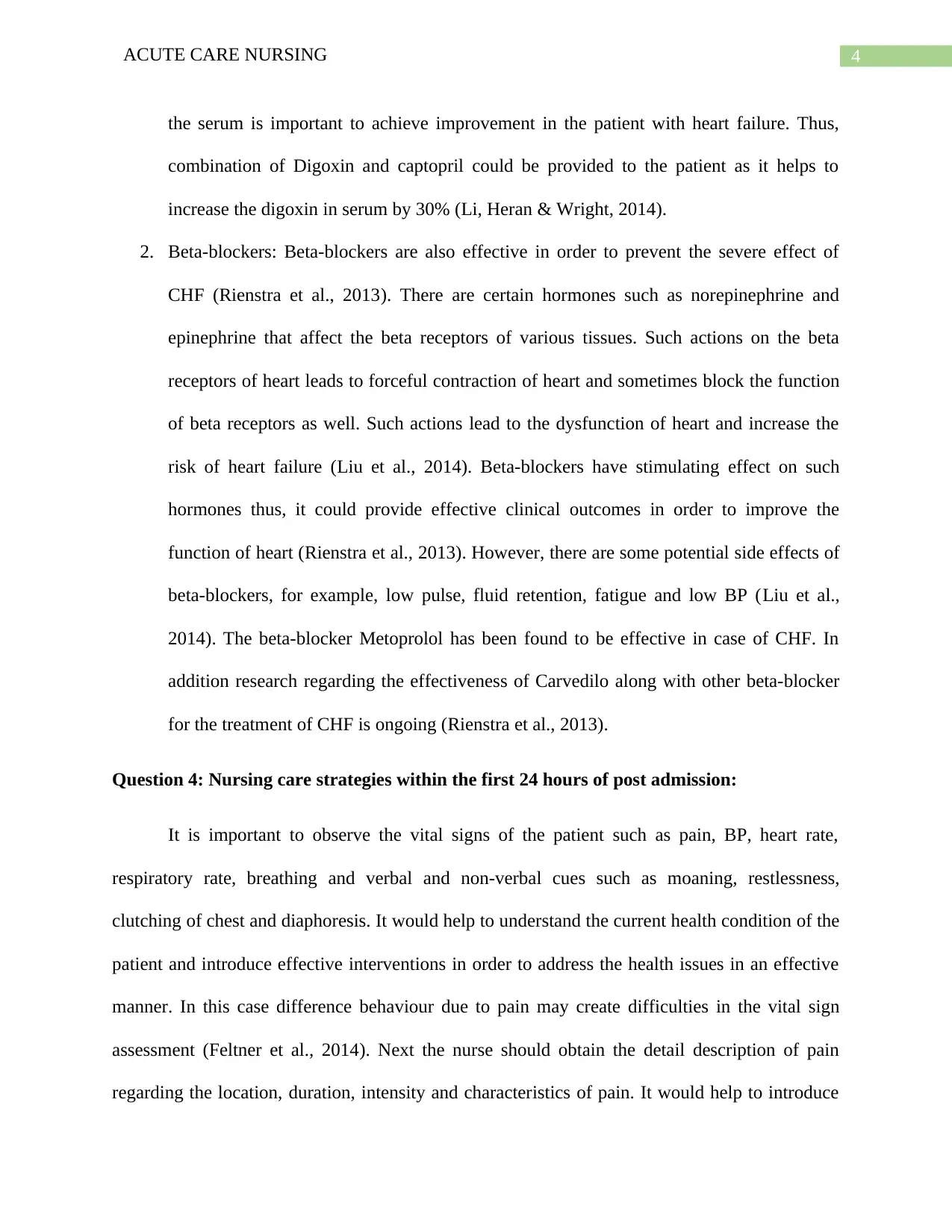
4ACUTE CARE NURSING
the serum is important to achieve improvement in the patient with heart failure. Thus,
combination of Digoxin and captopril could be provided to the patient as it helps to
increase the digoxin in serum by 30% (Li, Heran & Wright, 2014).
2. Beta-blockers: Beta-blockers are also effective in order to prevent the severe effect of
CHF (Rienstra et al., 2013). There are certain hormones such as norepinephrine and
epinephrine that affect the beta receptors of various tissues. Such actions on the beta
receptors of heart leads to forceful contraction of heart and sometimes block the function
of beta receptors as well. Such actions lead to the dysfunction of heart and increase the
risk of heart failure (Liu et al., 2014). Beta-blockers have stimulating effect on such
hormones thus, it could provide effective clinical outcomes in order to improve the
function of heart (Rienstra et al., 2013). However, there are some potential side effects of
beta-blockers, for example, low pulse, fluid retention, fatigue and low BP (Liu et al.,
2014). The beta-blocker Metoprolol has been found to be effective in case of CHF. In
addition research regarding the effectiveness of Carvedilo along with other beta-blocker
for the treatment of CHF is ongoing (Rienstra et al., 2013).
Question 4: Nursing care strategies within the first 24 hours of post admission:
It is important to observe the vital signs of the patient such as pain, BP, heart rate,
respiratory rate, breathing and verbal and non-verbal cues such as moaning, restlessness,
clutching of chest and diaphoresis. It would help to understand the current health condition of the
patient and introduce effective interventions in order to address the health issues in an effective
manner. In this case difference behaviour due to pain may create difficulties in the vital sign
assessment (Feltner et al., 2014). Next the nurse should obtain the detail description of pain
regarding the location, duration, intensity and characteristics of pain. It would help to introduce
the serum is important to achieve improvement in the patient with heart failure. Thus,
combination of Digoxin and captopril could be provided to the patient as it helps to
increase the digoxin in serum by 30% (Li, Heran & Wright, 2014).
2. Beta-blockers: Beta-blockers are also effective in order to prevent the severe effect of
CHF (Rienstra et al., 2013). There are certain hormones such as norepinephrine and
epinephrine that affect the beta receptors of various tissues. Such actions on the beta
receptors of heart leads to forceful contraction of heart and sometimes block the function
of beta receptors as well. Such actions lead to the dysfunction of heart and increase the
risk of heart failure (Liu et al., 2014). Beta-blockers have stimulating effect on such
hormones thus, it could provide effective clinical outcomes in order to improve the
function of heart (Rienstra et al., 2013). However, there are some potential side effects of
beta-blockers, for example, low pulse, fluid retention, fatigue and low BP (Liu et al.,
2014). The beta-blocker Metoprolol has been found to be effective in case of CHF. In
addition research regarding the effectiveness of Carvedilo along with other beta-blocker
for the treatment of CHF is ongoing (Rienstra et al., 2013).
Question 4: Nursing care strategies within the first 24 hours of post admission:
It is important to observe the vital signs of the patient such as pain, BP, heart rate,
respiratory rate, breathing and verbal and non-verbal cues such as moaning, restlessness,
clutching of chest and diaphoresis. It would help to understand the current health condition of the
patient and introduce effective interventions in order to address the health issues in an effective
manner. In this case difference behaviour due to pain may create difficulties in the vital sign
assessment (Feltner et al., 2014). Next the nurse should obtain the detail description of pain
regarding the location, duration, intensity and characteristics of pain. It would help to introduce
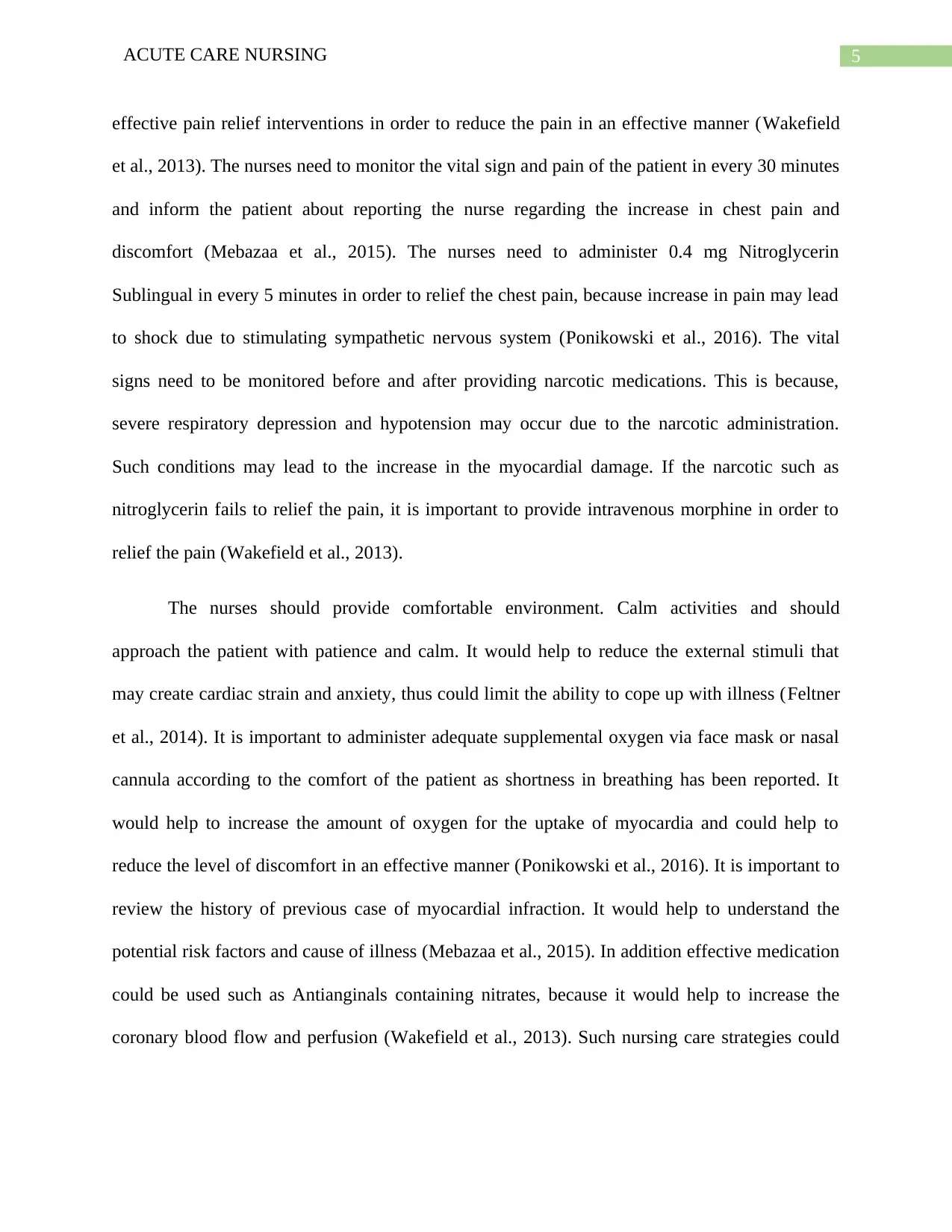
5ACUTE CARE NURSING
effective pain relief interventions in order to reduce the pain in an effective manner (Wakefield
et al., 2013). The nurses need to monitor the vital sign and pain of the patient in every 30 minutes
and inform the patient about reporting the nurse regarding the increase in chest pain and
discomfort (Mebazaa et al., 2015). The nurses need to administer 0.4 mg Nitroglycerin
Sublingual in every 5 minutes in order to relief the chest pain, because increase in pain may lead
to shock due to stimulating sympathetic nervous system (Ponikowski et al., 2016). The vital
signs need to be monitored before and after providing narcotic medications. This is because,
severe respiratory depression and hypotension may occur due to the narcotic administration.
Such conditions may lead to the increase in the myocardial damage. If the narcotic such as
nitroglycerin fails to relief the pain, it is important to provide intravenous morphine in order to
relief the pain (Wakefield et al., 2013).
The nurses should provide comfortable environment. Calm activities and should
approach the patient with patience and calm. It would help to reduce the external stimuli that
may create cardiac strain and anxiety, thus could limit the ability to cope up with illness (Feltner
et al., 2014). It is important to administer adequate supplemental oxygen via face mask or nasal
cannula according to the comfort of the patient as shortness in breathing has been reported. It
would help to increase the amount of oxygen for the uptake of myocardia and could help to
reduce the level of discomfort in an effective manner (Ponikowski et al., 2016). It is important to
review the history of previous case of myocardial infraction. It would help to understand the
potential risk factors and cause of illness (Mebazaa et al., 2015). In addition effective medication
could be used such as Antianginals containing nitrates, because it would help to increase the
coronary blood flow and perfusion (Wakefield et al., 2013). Such nursing care strategies could
effective pain relief interventions in order to reduce the pain in an effective manner (Wakefield
et al., 2013). The nurses need to monitor the vital sign and pain of the patient in every 30 minutes
and inform the patient about reporting the nurse regarding the increase in chest pain and
discomfort (Mebazaa et al., 2015). The nurses need to administer 0.4 mg Nitroglycerin
Sublingual in every 5 minutes in order to relief the chest pain, because increase in pain may lead
to shock due to stimulating sympathetic nervous system (Ponikowski et al., 2016). The vital
signs need to be monitored before and after providing narcotic medications. This is because,
severe respiratory depression and hypotension may occur due to the narcotic administration.
Such conditions may lead to the increase in the myocardial damage. If the narcotic such as
nitroglycerin fails to relief the pain, it is important to provide intravenous morphine in order to
relief the pain (Wakefield et al., 2013).
The nurses should provide comfortable environment. Calm activities and should
approach the patient with patience and calm. It would help to reduce the external stimuli that
may create cardiac strain and anxiety, thus could limit the ability to cope up with illness (Feltner
et al., 2014). It is important to administer adequate supplemental oxygen via face mask or nasal
cannula according to the comfort of the patient as shortness in breathing has been reported. It
would help to increase the amount of oxygen for the uptake of myocardia and could help to
reduce the level of discomfort in an effective manner (Ponikowski et al., 2016). It is important to
review the history of previous case of myocardial infraction. It would help to understand the
potential risk factors and cause of illness (Mebazaa et al., 2015). In addition effective medication
could be used such as Antianginals containing nitrates, because it would help to increase the
coronary blood flow and perfusion (Wakefield et al., 2013). Such nursing care strategies could
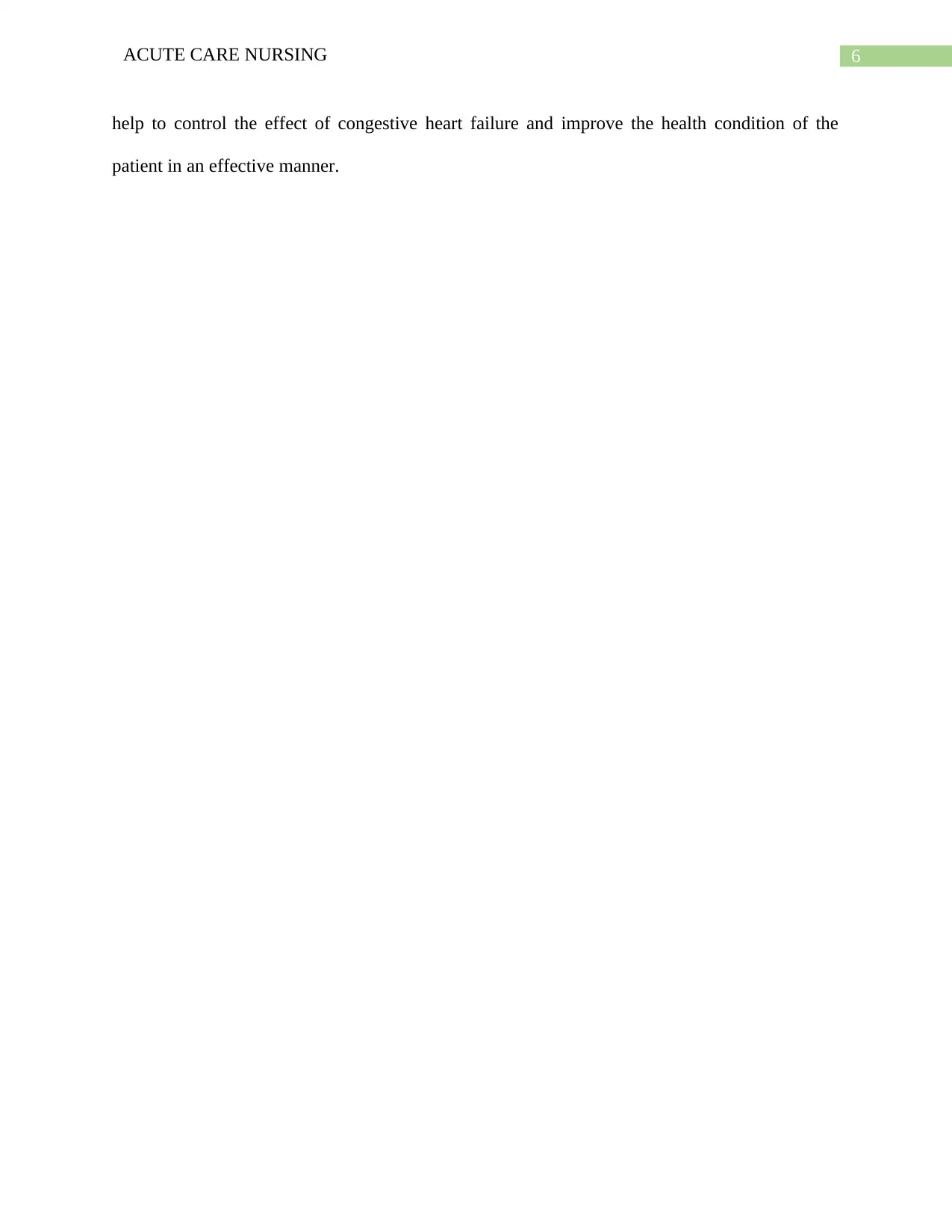
6ACUTE CARE NURSING
help to control the effect of congestive heart failure and improve the health condition of the
patient in an effective manner.
help to control the effect of congestive heart failure and improve the health condition of the
patient in an effective manner.
Paraphrase This Document
Need a fresh take? Get an instant paraphrase of this document with our AI Paraphraser
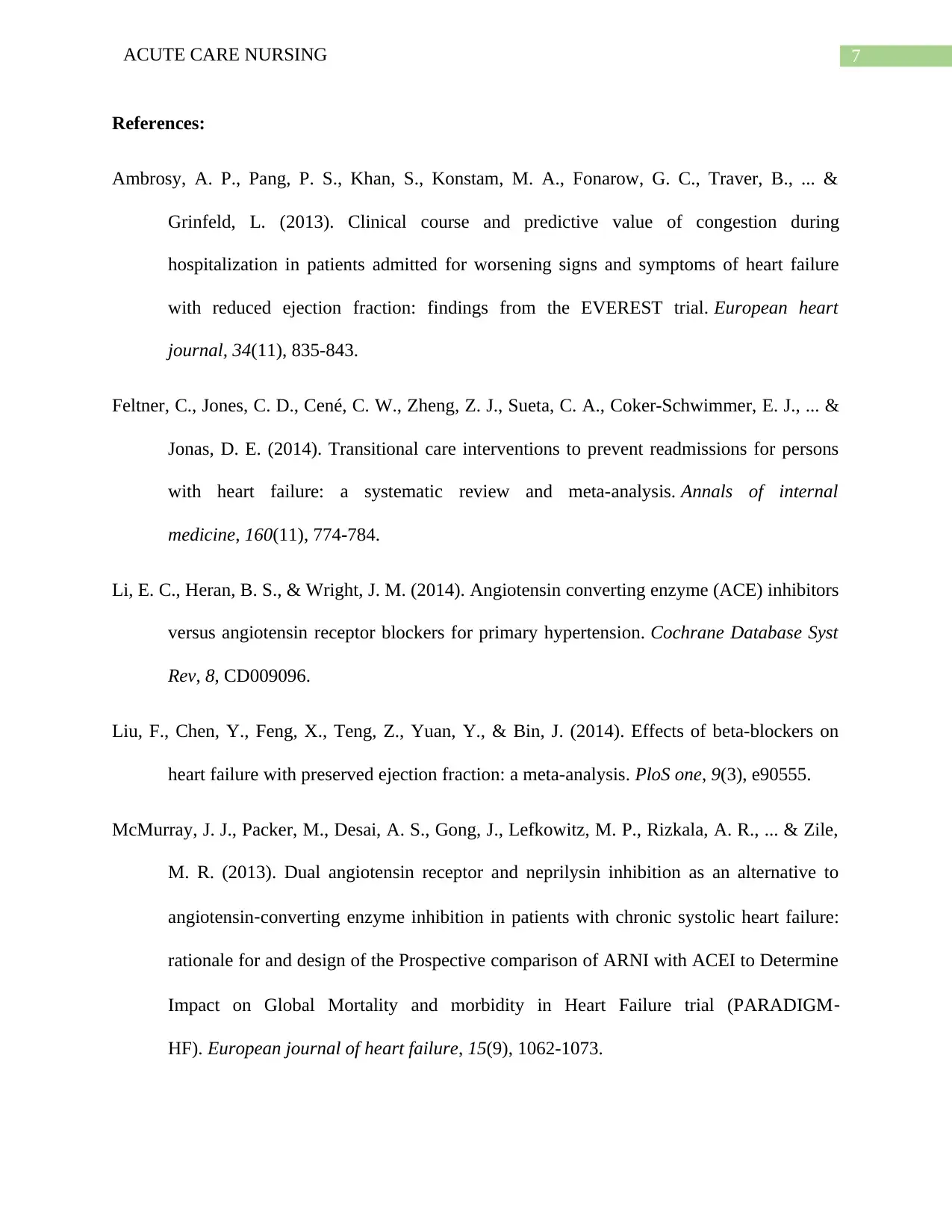
7ACUTE CARE NURSING
References:
Ambrosy, A. P., Pang, P. S., Khan, S., Konstam, M. A., Fonarow, G. C., Traver, B., ... &
Grinfeld, L. (2013). Clinical course and predictive value of congestion during
hospitalization in patients admitted for worsening signs and symptoms of heart failure
with reduced ejection fraction: findings from the EVEREST trial. European heart
journal, 34(11), 835-843.
Feltner, C., Jones, C. D., Cené, C. W., Zheng, Z. J., Sueta, C. A., Coker-Schwimmer, E. J., ... &
Jonas, D. E. (2014). Transitional care interventions to prevent readmissions for persons
with heart failure: a systematic review and meta-analysis. Annals of internal
medicine, 160(11), 774-784.
Li, E. C., Heran, B. S., & Wright, J. M. (2014). Angiotensin converting enzyme (ACE) inhibitors
versus angiotensin receptor blockers for primary hypertension. Cochrane Database Syst
Rev, 8, CD009096.
Liu, F., Chen, Y., Feng, X., Teng, Z., Yuan, Y., & Bin, J. (2014). Effects of beta-blockers on
heart failure with preserved ejection fraction: a meta-analysis. PloS one, 9(3), e90555.
McMurray, J. J., Packer, M., Desai, A. S., Gong, J., Lefkowitz, M. P., Rizkala, A. R., ... & Zile,
M. R. (2013). Dual angiotensin receptor and neprilysin inhibition as an alternative to
angiotensin‐converting enzyme inhibition in patients with chronic systolic heart failure:
rationale for and design of the Prospective comparison of ARNI with ACEI to Determine
Impact on Global Mortality and morbidity in Heart Failure trial (PARADIGM‐
HF). European journal of heart failure, 15(9), 1062-1073.
References:
Ambrosy, A. P., Pang, P. S., Khan, S., Konstam, M. A., Fonarow, G. C., Traver, B., ... &
Grinfeld, L. (2013). Clinical course and predictive value of congestion during
hospitalization in patients admitted for worsening signs and symptoms of heart failure
with reduced ejection fraction: findings from the EVEREST trial. European heart
journal, 34(11), 835-843.
Feltner, C., Jones, C. D., Cené, C. W., Zheng, Z. J., Sueta, C. A., Coker-Schwimmer, E. J., ... &
Jonas, D. E. (2014). Transitional care interventions to prevent readmissions for persons
with heart failure: a systematic review and meta-analysis. Annals of internal
medicine, 160(11), 774-784.
Li, E. C., Heran, B. S., & Wright, J. M. (2014). Angiotensin converting enzyme (ACE) inhibitors
versus angiotensin receptor blockers for primary hypertension. Cochrane Database Syst
Rev, 8, CD009096.
Liu, F., Chen, Y., Feng, X., Teng, Z., Yuan, Y., & Bin, J. (2014). Effects of beta-blockers on
heart failure with preserved ejection fraction: a meta-analysis. PloS one, 9(3), e90555.
McMurray, J. J., Packer, M., Desai, A. S., Gong, J., Lefkowitz, M. P., Rizkala, A. R., ... & Zile,
M. R. (2013). Dual angiotensin receptor and neprilysin inhibition as an alternative to
angiotensin‐converting enzyme inhibition in patients with chronic systolic heart failure:
rationale for and design of the Prospective comparison of ARNI with ACEI to Determine
Impact on Global Mortality and morbidity in Heart Failure trial (PARADIGM‐
HF). European journal of heart failure, 15(9), 1062-1073.
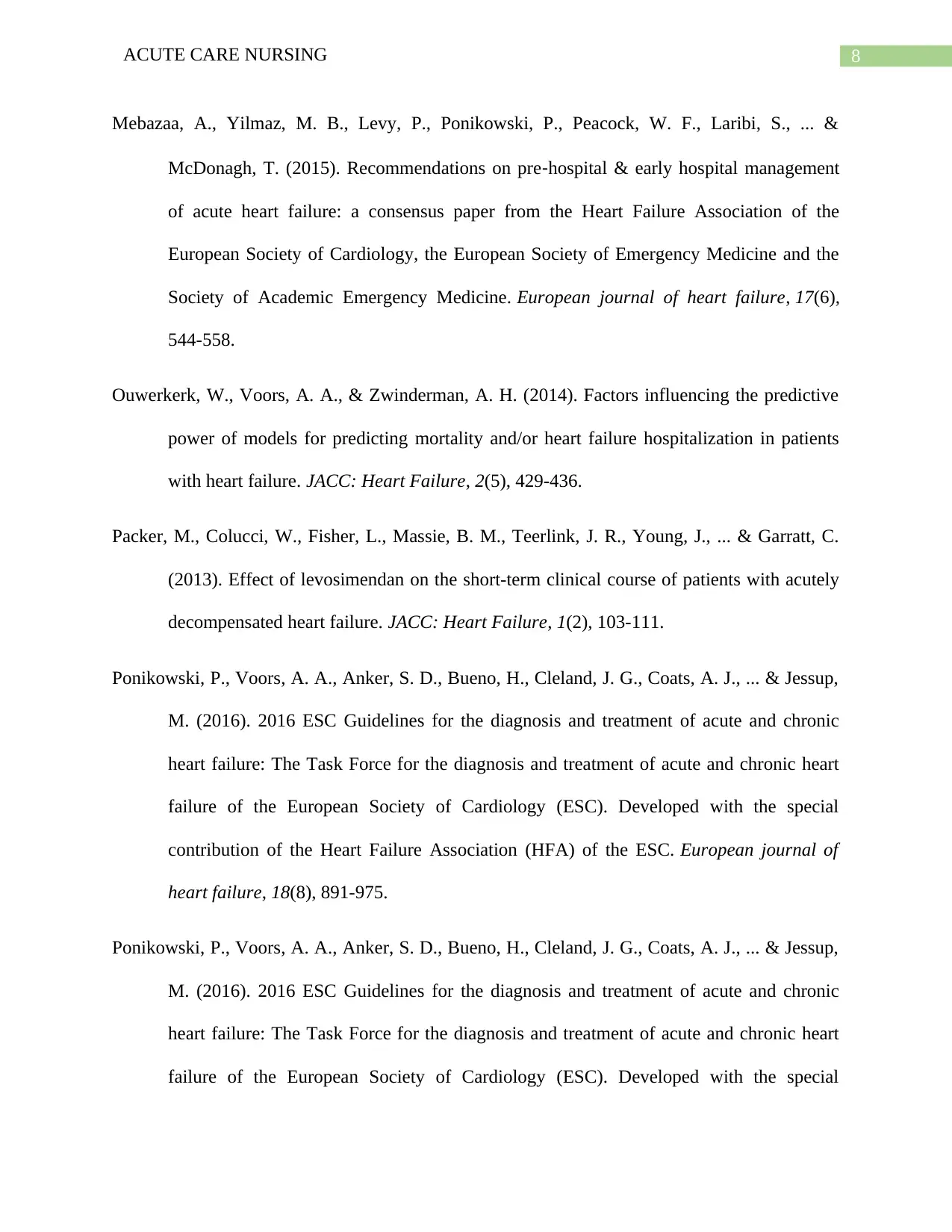
8ACUTE CARE NURSING
Mebazaa, A., Yilmaz, M. B., Levy, P., Ponikowski, P., Peacock, W. F., Laribi, S., ... &
McDonagh, T. (2015). Recommendations on pre‐hospital & early hospital management
of acute heart failure: a consensus paper from the Heart Failure Association of the
European Society of Cardiology, the European Society of Emergency Medicine and the
Society of Academic Emergency Medicine. European journal of heart failure, 17(6),
544-558.
Ouwerkerk, W., Voors, A. A., & Zwinderman, A. H. (2014). Factors influencing the predictive
power of models for predicting mortality and/or heart failure hospitalization in patients
with heart failure. JACC: Heart Failure, 2(5), 429-436.
Packer, M., Colucci, W., Fisher, L., Massie, B. M., Teerlink, J. R., Young, J., ... & Garratt, C.
(2013). Effect of levosimendan on the short-term clinical course of patients with acutely
decompensated heart failure. JACC: Heart Failure, 1(2), 103-111.
Ponikowski, P., Voors, A. A., Anker, S. D., Bueno, H., Cleland, J. G., Coats, A. J., ... & Jessup,
M. (2016). 2016 ESC Guidelines for the diagnosis and treatment of acute and chronic
heart failure: The Task Force for the diagnosis and treatment of acute and chronic heart
failure of the European Society of Cardiology (ESC). Developed with the special
contribution of the Heart Failure Association (HFA) of the ESC. European journal of
heart failure, 18(8), 891-975.
Ponikowski, P., Voors, A. A., Anker, S. D., Bueno, H., Cleland, J. G., Coats, A. J., ... & Jessup,
M. (2016). 2016 ESC Guidelines for the diagnosis and treatment of acute and chronic
heart failure: The Task Force for the diagnosis and treatment of acute and chronic heart
failure of the European Society of Cardiology (ESC). Developed with the special
Mebazaa, A., Yilmaz, M. B., Levy, P., Ponikowski, P., Peacock, W. F., Laribi, S., ... &
McDonagh, T. (2015). Recommendations on pre‐hospital & early hospital management
of acute heart failure: a consensus paper from the Heart Failure Association of the
European Society of Cardiology, the European Society of Emergency Medicine and the
Society of Academic Emergency Medicine. European journal of heart failure, 17(6),
544-558.
Ouwerkerk, W., Voors, A. A., & Zwinderman, A. H. (2014). Factors influencing the predictive
power of models for predicting mortality and/or heart failure hospitalization in patients
with heart failure. JACC: Heart Failure, 2(5), 429-436.
Packer, M., Colucci, W., Fisher, L., Massie, B. M., Teerlink, J. R., Young, J., ... & Garratt, C.
(2013). Effect of levosimendan on the short-term clinical course of patients with acutely
decompensated heart failure. JACC: Heart Failure, 1(2), 103-111.
Ponikowski, P., Voors, A. A., Anker, S. D., Bueno, H., Cleland, J. G., Coats, A. J., ... & Jessup,
M. (2016). 2016 ESC Guidelines for the diagnosis and treatment of acute and chronic
heart failure: The Task Force for the diagnosis and treatment of acute and chronic heart
failure of the European Society of Cardiology (ESC). Developed with the special
contribution of the Heart Failure Association (HFA) of the ESC. European journal of
heart failure, 18(8), 891-975.
Ponikowski, P., Voors, A. A., Anker, S. D., Bueno, H., Cleland, J. G., Coats, A. J., ... & Jessup,
M. (2016). 2016 ESC Guidelines for the diagnosis and treatment of acute and chronic
heart failure: The Task Force for the diagnosis and treatment of acute and chronic heart
failure of the European Society of Cardiology (ESC). Developed with the special
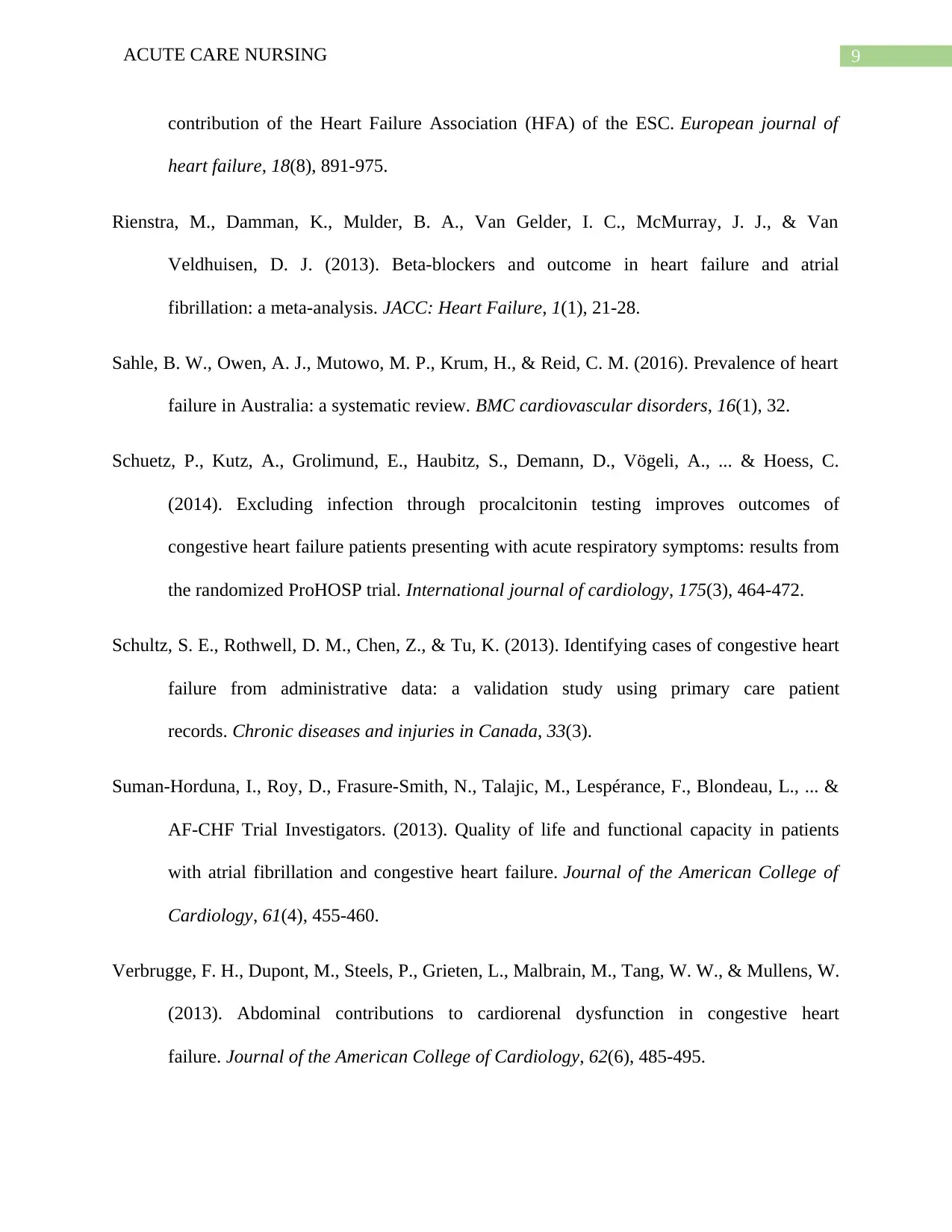
9ACUTE CARE NURSING
contribution of the Heart Failure Association (HFA) of the ESC. European journal of
heart failure, 18(8), 891-975.
Rienstra, M., Damman, K., Mulder, B. A., Van Gelder, I. C., McMurray, J. J., & Van
Veldhuisen, D. J. (2013). Beta-blockers and outcome in heart failure and atrial
fibrillation: a meta-analysis. JACC: Heart Failure, 1(1), 21-28.
Sahle, B. W., Owen, A. J., Mutowo, M. P., Krum, H., & Reid, C. M. (2016). Prevalence of heart
failure in Australia: a systematic review. BMC cardiovascular disorders, 16(1), 32.
Schuetz, P., Kutz, A., Grolimund, E., Haubitz, S., Demann, D., Vögeli, A., ... & Hoess, C.
(2014). Excluding infection through procalcitonin testing improves outcomes of
congestive heart failure patients presenting with acute respiratory symptoms: results from
the randomized ProHOSP trial. International journal of cardiology, 175(3), 464-472.
Schultz, S. E., Rothwell, D. M., Chen, Z., & Tu, K. (2013). Identifying cases of congestive heart
failure from administrative data: a validation study using primary care patient
records. Chronic diseases and injuries in Canada, 33(3).
Suman-Horduna, I., Roy, D., Frasure-Smith, N., Talajic, M., Lespérance, F., Blondeau, L., ... &
AF-CHF Trial Investigators. (2013). Quality of life and functional capacity in patients
with atrial fibrillation and congestive heart failure. Journal of the American College of
Cardiology, 61(4), 455-460.
Verbrugge, F. H., Dupont, M., Steels, P., Grieten, L., Malbrain, M., Tang, W. W., & Mullens, W.
(2013). Abdominal contributions to cardiorenal dysfunction in congestive heart
failure. Journal of the American College of Cardiology, 62(6), 485-495.
contribution of the Heart Failure Association (HFA) of the ESC. European journal of
heart failure, 18(8), 891-975.
Rienstra, M., Damman, K., Mulder, B. A., Van Gelder, I. C., McMurray, J. J., & Van
Veldhuisen, D. J. (2013). Beta-blockers and outcome in heart failure and atrial
fibrillation: a meta-analysis. JACC: Heart Failure, 1(1), 21-28.
Sahle, B. W., Owen, A. J., Mutowo, M. P., Krum, H., & Reid, C. M. (2016). Prevalence of heart
failure in Australia: a systematic review. BMC cardiovascular disorders, 16(1), 32.
Schuetz, P., Kutz, A., Grolimund, E., Haubitz, S., Demann, D., Vögeli, A., ... & Hoess, C.
(2014). Excluding infection through procalcitonin testing improves outcomes of
congestive heart failure patients presenting with acute respiratory symptoms: results from
the randomized ProHOSP trial. International journal of cardiology, 175(3), 464-472.
Schultz, S. E., Rothwell, D. M., Chen, Z., & Tu, K. (2013). Identifying cases of congestive heart
failure from administrative data: a validation study using primary care patient
records. Chronic diseases and injuries in Canada, 33(3).
Suman-Horduna, I., Roy, D., Frasure-Smith, N., Talajic, M., Lespérance, F., Blondeau, L., ... &
AF-CHF Trial Investigators. (2013). Quality of life and functional capacity in patients
with atrial fibrillation and congestive heart failure. Journal of the American College of
Cardiology, 61(4), 455-460.
Verbrugge, F. H., Dupont, M., Steels, P., Grieten, L., Malbrain, M., Tang, W. W., & Mullens, W.
(2013). Abdominal contributions to cardiorenal dysfunction in congestive heart
failure. Journal of the American College of Cardiology, 62(6), 485-495.
Secure Best Marks with AI Grader
Need help grading? Try our AI Grader for instant feedback on your assignments.
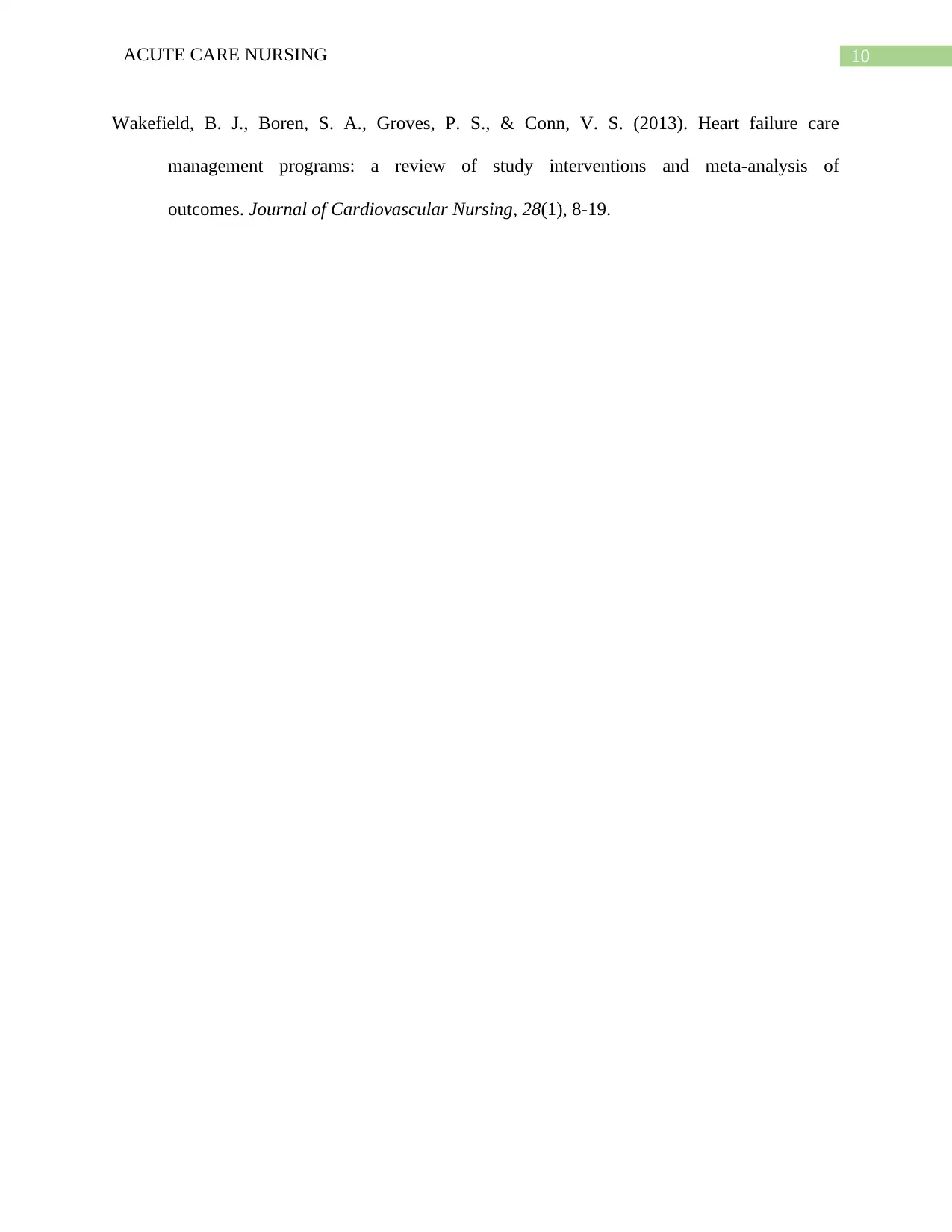
10ACUTE CARE NURSING
Wakefield, B. J., Boren, S. A., Groves, P. S., & Conn, V. S. (2013). Heart failure care
management programs: a review of study interventions and meta-analysis of
outcomes. Journal of Cardiovascular Nursing, 28(1), 8-19.
Wakefield, B. J., Boren, S. A., Groves, P. S., & Conn, V. S. (2013). Heart failure care
management programs: a review of study interventions and meta-analysis of
outcomes. Journal of Cardiovascular Nursing, 28(1), 8-19.
1 out of 11
Related Documents
Your All-in-One AI-Powered Toolkit for Academic Success.
+13062052269
info@desklib.com
Available 24*7 on WhatsApp / Email
![[object Object]](/_next/static/media/star-bottom.7253800d.svg)
Unlock your academic potential
© 2024 | Zucol Services PVT LTD | All rights reserved.




